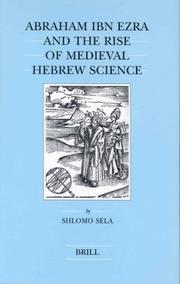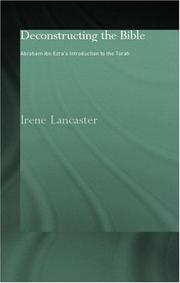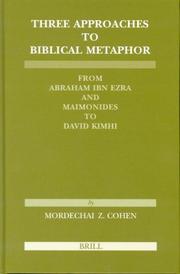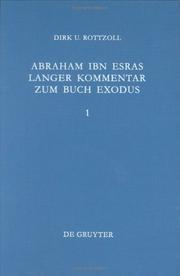| Listing 1 - 10 of 16 | << page >> |
Sort by
|
Book
Year: 2000 Publisher: Bruxelles Institutum Iudaicum
Abstract | Keywords | Export | Availability | Bookmark
 Loading...
Loading...Choose an application
- Reference Manager
- EndNote
- RefWorks (Direct export to RefWorks)
Book
Abstract | Keywords | Export | Availability | Bookmark
 Loading...
Loading...Choose an application
- Reference Manager
- EndNote
- RefWorks (Direct export to RefWorks)
Book
ISBN: 9652261033 Year: 1989 Publisher: Ramat Gan Bar Ilan university press
Abstract | Keywords | Export | Availability | Bookmark
 Loading...
Loading...Choose an application
- Reference Manager
- EndNote
- RefWorks (Direct export to RefWorks)
Ibn Ezra, Abraham ben Meïr, --- Criticism, Textual. --- Bible.

ISBN: 9004129731 Year: 2003 Publisher: Leiden Boston Brill
Abstract | Keywords | Export | Availability | Bookmark
 Loading...
Loading...Choose an application
- Reference Manager
- EndNote
- RefWorks (Direct export to RefWorks)

ISBN: 0700715746 9780700715749 Year: 2002 Publisher: New York: Routledge/Curzon,
Abstract | Keywords | Export | Availability | Bookmark
 Loading...
Loading...Choose an application
- Reference Manager
- EndNote
- RefWorks (Direct export to RefWorks)
Book
Year: 1929 Publisher: Wageningen : H. Veenman & Zonen,
Abstract | Keywords | Export | Availability | Bookmark
 Loading...
Loading...Choose an application
- Reference Manager
- EndNote
- RefWorks (Direct export to RefWorks)
Messiah. --- Rashi, --- Ibn Ezra, Abraham ben Meïr, --- Kimhi, David, --- Bible. --- Commentaries.

ISBN: 9789004493810 9789004129719 Year: 2003 Publisher: Leiden; Boston : BRILL
Abstract | Keywords | Export | Availability | Bookmark
 Loading...
Loading...Choose an application
- Reference Manager
- EndNote
- RefWorks (Direct export to RefWorks)
This volume explores how the poetic technique of biblical metaphor was analyzed within the Jewish exegetical tradition that developed in Muslim Spain during the Golden Age of Hebrew poetry and was then transplanted to a Christian milieu. Abraham Ibn Ezra and Maimonides applied concepts from Arabic poetics, hermeneutics and logic to define metaphor and interpret it within their philological-literary readings of Scripture. David Kimhi integrated their methodologies with the midrashic creativity and sensitivity to nuance typical of his native Provence to create a new literary interpretive system that highlights the expressiveness of metaphor. This study is important for readers interested in metaphor, the Bible as literature, the history of biblical interpretation and the inter-relation between Arabic and Hebrew learning.
Bible as literature --- Metaphor in the Bible --- Ibn Ezra, Abraham ben Meïr, --- Kimhi, David, --- Maimonides, Moses, --- Bible. --- Criticism, interpretation, etc., Jewish --- History --- Language, style.
Book
ISBN: 9004522603 Year: 2022 Publisher: Leiden ; Boston : Brill,
Abstract | Keywords | Export | Availability | Bookmark
 Loading...
Loading...Choose an application
- Reference Manager
- EndNote
- RefWorks (Direct export to RefWorks)
The present volume focuses on Henry Bate, the first scholar to bring Ibn Ezra’s astrological work to the knowledge of Latin readers, and offers critical editions of all six of Henry Bate’s complete translations of Ibn Ezra’s astrological writings. The present volume focuses on Henry Bate of Mechelen (1246–after 1310), the first scholar to bring Ibn Ezra’s astrological work to the knowledge of Latin readers. The volume has two main objectives. The first is to offer as complete and panoramic an account as possible of Bate’s translational project. Therefore, this volume offers critical editions of all six of Bate’s complete translations of Ibn Ezra’s astrological writings. The second objective is to accompany Bate’s Latin translations with literal English translations and to offer a thorough collation of the Latin translation (with their English translations) against the Hebrew and French source texts. This is volume 1 of a two-volume set.
History & Culture. --- History. --- Jewish Studies. --- Literature & Linguistics. --- Literature and Cultural Studies. --- Literature, Arts & Science. --- Manuscripts & Book History. --- Medieval History. --- Astrologers. --- Astrology. --- Literature, Medieval. --- Ibn Ezra, Abraham ben Meïr,

ISBN: 3110164752 3110803240 9783110164756 Year: 2000 Volume: 17 / 1-2 Publisher: Berlin de Gruyter
Abstract | Keywords | Export | Availability | Bookmark
 Loading...
Loading...Choose an application
- Reference Manager
- EndNote
- RefWorks (Direct export to RefWorks)
Der mittelalterliche jüdische Bibelgelehrte Abraham ibn Esra wurde um 1089 in Spanien geboren, wanderte kurz vor 1140 nach Italien aus und zog später nach Frankreich und England weiter. Er starb im Jahre 1164. Das Werk liefert in zwei Teilbänden eine deutschsprachige Edition von Abraham ibn Esras langem, im Jahre 1153 in Frankreich verfaßtem Kommentar zum Buch Exodus auf der Basis der Warschauer-Textausgabe sowie mehrerer Handschriften. Neben der kritischen, mit ausführlichen Kommentaren versehenen Übersetzung finden sich zu Beginn der Edition zwei umfangreiche Einleitungen: Die erste Einleitung geht u.a. den Fragen nach, ob Abraham ibn Esra der Verfasser des edierten Kommentars ist und wann und wo er ihn verfaßte. Die zweite Einleitung beschäftigt sich mit den von Abraham ibn Esra benutzten Quellen; dadurch wird sie zu einer grundlegenden Einführung in die jüdische Bibelexegese der klassischen Periode überhaupt. The medieval biblical scholar Abraham ibn Ezra was born about 1089 CE in Spain, emigrated shortly before 1140 to Italy, and later went on to France and England. He died in the year 1164. On the basis of the Warsaw textual edition as well as several manuscripts, this work in two volumes offers a German edition of Abraham ibn Ezra’s long commentary on the book of Exodus, written in the year 1153 in France. In addition to the critical translation, accompanied by extensive commentary, there are two comprehensive introductions at the beginning of the present edition: the first deals among other things with the questions of whether Abraham ibn Ezra is the author of the commentary edited, and when and where he wrote it. The second is concerned with the sources employed by Abraham ibn Ezra; therefore the edition becomes a basic introduction to Jewish exegesis of the Bible in the classical period.
Rabbinical literature --- History and criticism --- Ibn Ezra, Abraham ben Meïr, --- Bible --- 222.3 --- Exodus. Leviticus. Numeri --- History and criticism. --- Bible. --- Chʻuraegŭpki (Book of the Old Testament) --- Exodus (Book of the Old Testament) --- Khurūj --- Kitāb-i Shimūt (Book of the Old Testament) --- Shemot --- Sifr al-Khurūj (Book of the Old Testament) --- Shemos --- Rabbinical literature - History and criticism --- Ibn Ezra, Abraham ben Meïr, - 1089-1164 - Sefer Ibn Ezra le-sefer Shemot
Book
ISBN: 2204042617 9782204042611 Year: 1991 Publisher: Paris Cerf
Abstract | Keywords | Export | Availability | Bookmark
 Loading...
Loading...Choose an application
- Reference Manager
- EndNote
- RefWorks (Direct export to RefWorks)
Karaites --- Karaïtes --- Comtino, Mordecai ben Eliezer, --- Ibn Ezra, Abraham ben Meïr, --- Bible. --- Criticism, interpretation, etc., Jewish. --- Karaites. --- 296*16 --- Baʻale Miḳra --- Baʻalei Mikra --- Bene Miḳra --- Benei Mikra --- Karaʾim (Jewish sect) --- Karaism --- Karaitism --- Jewish sects --- Joodse bijbelwetenschap--(middeleeuwse en moderne) --- Comtino, Mordecai ben Eliezer --- Ibn Ezra, Abraham ben Meir --- 296*16 Joodse bijbelwetenschap--(middeleeuwse en moderne) --- Karaïtes --- Ibn Ezra, Abraham ben Meïr, --- Khomatiano, Mordekhai, --- Komtino, Mordekhai, --- Komṭyano, Mordekhai, --- כומטינו, מרדכי בן אליעזר, --- Chumash --- Five Books of Moses --- Ḥamishah ḥumshe Torah --- Ḥumash --- Kitāb-i Muqqadas --- Mose Ogyŏng (Book of the Old Testament) --- Pentateuch --- Pi︠a︡toknizhīe Moiseevo --- Sefer Ḥamishah ḥumshe Torah --- Tawrāh --- Torà (Pentateuch) --- Torah (Pentateuch) --- Tʻoris xutʻcigneuli --- Ureta --- תורה --- Haftarot
| Listing 1 - 10 of 16 | << page >> |
Sort by
|

 Search
Search Feedback
Feedback About UniCat
About UniCat  Help
Help News
News